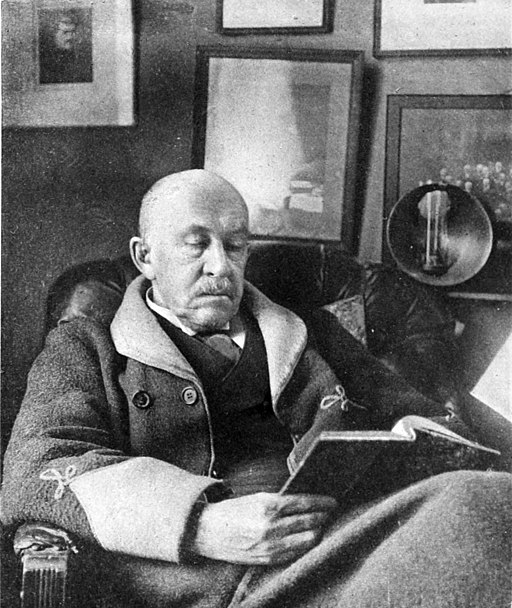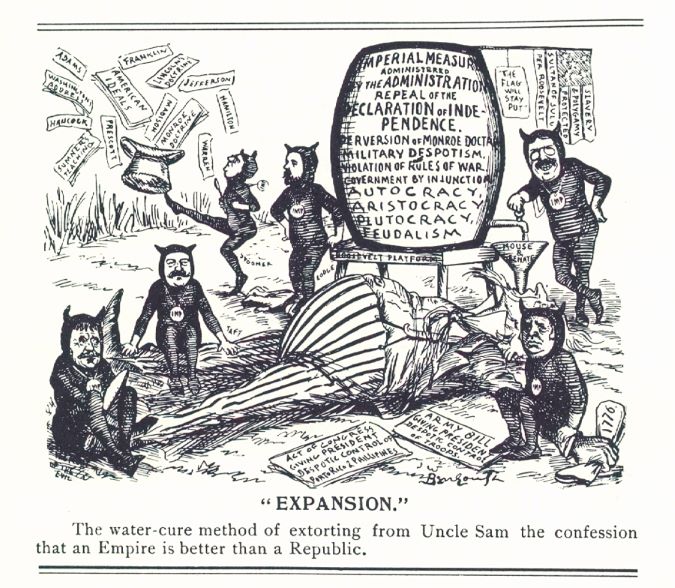Liberty Matters
Sumner, the Spanish-American War, and the Anti-Imperialist League
 Sumner attracted the ire of the pro-imperialist forces as this cartoon from 1902 shows. The detailed explanation of what is depicted in the cartoon is provided below but the magnified section from the top left hand corner shows its intent. He is one of the 13 pieces of paper being kicked into the air in disgust by one of Teddy Rooselvelt's "Imps" - it is labelled "Sumner's Teachings" - which suggests that his ideas as espoused in his teaching and writing was considered to be a threat to their program of imperial expansion.
Sumner attracted the ire of the pro-imperialist forces as this cartoon from 1902 shows. The detailed explanation of what is depicted in the cartoon is provided below but the magnified section from the top left hand corner shows its intent. He is one of the 13 pieces of paper being kicked into the air in disgust by one of Teddy Rooselvelt's "Imps" - it is labelled "Sumner's Teachings" - which suggests that his ideas as espoused in his teaching and writing was considered to be a threat to their program of imperial expansion.The cartoon was entitled "Expansion: The Water-Cure method of extorting from Uncle Sam the confession that an Empire is better than a Republic" and it appeared in the January 31, 1902 edition of the Chicago magazine The Public which was edited by Louis Freeland Post (1849-1928).
 In the Spanish-American War of 1898 the U.S. defeated Spain and acquired its colonies in the Philippines, Puerto Rico, and Guam. This policy was opposed by members of the Anti-Imperialist League and by liberals such as Post on the grounds that it violated the principles of Jefferson (The Declaration of Independence), Washington (his Farewell Address), and Lincoln. Post was trained as a lawyer and had become interested in the free trade and single tax ideas of Henry George which he promoted in the magazines he edited and the books he published. The Anti-Imperialist League began in June 1898 in opposition to the war against Spain and included an impressive list of establishment politicians, academics, and authors such as Charles Francis Adams, Jr., Jane Addams, Edward Atkinson, Ambrose Bierce, Andrew Carnegie, Samuel Clemens (Mark Twain), Grover Cleveland, John Dewey, Edwin Lawrence Godkin, Samuel Gompers, William Dean Howells, Henry James, William James, David Starr Jordan, Carl Schurz, William Graham Sumner, and Oswald Garrison Villard. The Platform of the Anti-Impeialism League from October 1899 is shown below.
In the Spanish-American War of 1898 the U.S. defeated Spain and acquired its colonies in the Philippines, Puerto Rico, and Guam. This policy was opposed by members of the Anti-Imperialist League and by liberals such as Post on the grounds that it violated the principles of Jefferson (The Declaration of Independence), Washington (his Farewell Address), and Lincoln. Post was trained as a lawyer and had become interested in the free trade and single tax ideas of Henry George which he promoted in the magazines he edited and the books he published. The Anti-Imperialist League began in June 1898 in opposition to the war against Spain and included an impressive list of establishment politicians, academics, and authors such as Charles Francis Adams, Jr., Jane Addams, Edward Atkinson, Ambrose Bierce, Andrew Carnegie, Samuel Clemens (Mark Twain), Grover Cleveland, John Dewey, Edwin Lawrence Godkin, Samuel Gompers, William Dean Howells, Henry James, William James, David Starr Jordan, Carl Schurz, William Graham Sumner, and Oswald Garrison Villard. The Platform of the Anti-Impeialism League from October 1899 is shown below.The cartoon shows the figure of Uncle Sam who has been pinned to the ground by members of Theodore Roosevelt's administration who are dressed like little devils (some are named: Taft, Spooner, Lodge) who have around their necks a medallion which says "IMP". They are using the Philippino "water torture" to force Uncle Sam (the House & the Senate) to confess that an Empire is better than a Republic. Theordore Roosevelt is the figure standing by the spigot administering the water torture to Uncle Sam. Above his head is a version of the American flag on which is written "Slavery & Polygamy Protected. Sultan of Sulu per Roosevelt" which is a refernce to the islamic Sultanate of Sulu which was a number of islands in the Sulu Sea in the southern part of the Philippines which also came under American control. Uncle Sam can be seen clutching a copy of the Declaration of Independence and one of the devils is kicking his hat which spills out papers which have the names of some of the key intellectuals who provided the League with its ideas on opposing Empire: Adams, Washington, Hancock, (William Graham) Sumner, Franklin, Lincoln, Madison, ect. The water barrel is called "Roosevelt's Platform" and has written on it "Imperial Measure administered by the Administration: Repeal of the Declaration of Independence. Perversion of Monroe Doctrine. Military Despotism. Violation of Rules of War. Government by Injunction. AUTOCRACY, ARISTOCRACY, PLUTOCRACY, FEUDALISM." In the foreground at the foot of one of the devils is a document which says "Act of Congress giving President despotic control of Puerto Rico & Philippines" and another which says "Army Bill giving President despotic control of troops." The title of the cartoon is "Expansion" which refers to both the territorial expansion of the U.S. after 1898 and the expansion of Uncle Sam's belly as large quantities of water are forced into his stomach as part of the "water cure" he is forced to endure.
Sumner's critique of the war can be found in his lecture "The Conquest of the United States by Spain" in 1898 in which he stated that:[103]
During the last year the public has been familiarized with descriptions of Spain and of Spanish methods of doing things until the name of Spain has become a symbol for a certain well-defined set of notions and policies. On the other hand, the name of the United States has always been, for all of us, a symbol for a state of things, a set of ideas and traditions, a group of views about social and political affairs. Spain was the first, for a long time the greatest, of the modern imperialistic states. The United States, by its historical origin, its traditions, and its principles, is the chief representative of the revolt and reaction against that kind of a state. I intend to show that, by the line of action now proposed to us, which we call expansion and imperialism, we are throwing away some of the most important elements of the American symbol and are adopting some of the most important elements of the Spanish symbol. We have beaten Spain in a military conflict, but we are submitting to be conquered by her on the field of ideas and policies. Expansionism and imperialism are nothing but the old philosophies of national prosperity which have brought Spain to where she now is. Those philosophies appeal to national vanity and national cupidity. They are seductive, especially upon the first view and the most superficial judgment, and therefore it cannot be denied that they are very strong for popular effect. They are delusions, and they will lead us to ruin unless we are hard-headed enough to resist them. In any case the year 1898 is a great landmark in the history of the United States. The consequences will not be all good or all bad, for such is not the nature of societal influences. They are always mixed of good and ill, and so it will be in this case. Fifty years from now the historian, looking back to 1898, will no doubt see, in the course which things will have taken, consequences of the proceedings of that year and of this present one which will not all be bad, but you will observe that that is not a justification for a happy-go-lucky policy; that does not affect our duty to-day in all that we do to seek wisdom and prudence and to determine our actions by the best judgment which we can form.... ... The laws of nature and of human nature are just as valid for Americans as for anybody else, and if we commit acts we shall have to take consequences, just like other people. Therefore prudence demands that we look ahead to see what we are about to do, and that we gauge the means at our disposal, if we do not want to bring calamity on ourselves and our children. We see that the peculiarities of our system of government set limitations on us. We cannot do things which a great centralized monarchy could do. The very blessings and special advantages which we enjoy, as compared with others, bring disabilities with them. That is the great fundamental cause of what I have tried to show throughout this lecture, that we cannot govern dependencies consistently with our political system, and that, if we try it, the State which our fathers founded will suffer a reaction which will transform it into another empire just after the fashion of all the old ones. That is what imperialism means. That is what it will be; and the democratic republic, which has been, will stand in history, like the colonial organization of earlier days, as a mere transition form.
Below is the Platform of the Anti-Imperialist League (October 1899) in which Sumner may well have a hand in writing:[104]
Endnotes
[103.] "The Spanish-American War and the Anti-Imperialism League (1902)" in William Graham Sumner, War and Other Essays, ed. Albert Galloway Keller (New Haven: Yale University Press, 1919). </titles/345#Sumner_0255_332>.
[104.] "Platform of the Anti-Imperialist League" (October 1899) in Carl Schurz, The Policy of Imperialism: Address by Hon. Carl Schurz at the Anti-Imperialist Conference in Chicago, October 17, 1899 (Chicago: American Anti-Imperialist League, 1899. Liberty Tracts, Number Four).
Copyright and Fair Use Statement
“Liberty Matters” is the copyright of Liberty Fund, Inc. This material is put on line to further the educational goals of Liberty Fund, Inc. These essays and responses may be quoted and otherwise used under “fair use” provisions for educational and academic purposes. To reprint these essays in course booklets requires the prior permission of Liberty Fund, Inc. Please contact oll@libertyfund.org if you have any questions.